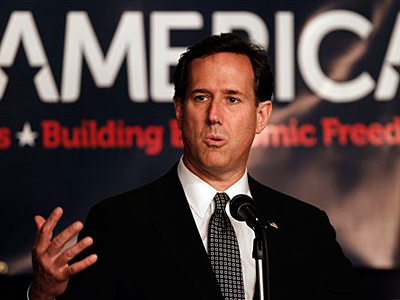February 28, 2012, primaries in Arizona and Michigan

Santorum in Michigan
GOP primaries in Michigan and Arizona today–and it will be mildly interesting to see which candidate Republican voters will be stuck with, if either. On the one hand they have the lurid imaginings of former Pennsylvania Rep. Rick Santorum, who is more and more coming to seem like the type of religio more hell-bent on damning other human beings than on sharpening his own conscience. Deafness to the promptings of conscience might or might not be expected of someone who spent his years out of office working as a corporate lobbyist in DC, even if the lurid version of religion dominating Santorum’s idiom is not stereotypically associated with the kind of inside-the-Beltway job Santorum held, and profited from.

Romney
On the other hand primary voters have former Massachusetts governor Mitt Romney, who famously penned an op-ed for the New York Times Nov. 18, 2008, titled “Let Detroit Go Bankrupt.” ‘Flip-flopper’ or not, Romney has stuck by his argument on this one, following up recently in Michigan with a Feb. 14 op-ed in a Detroit paper calling the auto rescue “crony capitalism.”

Automobiles and candidates
Santorum has been proclaiming a “two-man race” in the Republican primaries for several weeks. It seems like years. Most of the political press is following suit for the moment–while waiting to see whether Newt Gingrich’s race-baiting resuscitates the Gingrich campaign in the South in March. It is tempting to streamline the Romney-Santorum contest as a contest between the corporate-insider and barking-dog segments of the Republican Party, dignified as ‘wings.’ This would be over-simplification.
Not that Romney isn’t giving this over-simplification all the help he can. Set aside the off-the-cuff references to the two Cadillacs (American-made cars; that’s why Romney mentioned them in Michigan) his wife drives, or to the Nascar team owners Romney knows. More importantly, Romney also advocated letting the foreclosure crisis run its course, an argument obviously not targeted for Arizona. While Arizona’s foreclosure problems do not equate to those in neighboring Nevada, in December 2011 Arizona hit the top-ten list for foreclosures by state. Spikes in oil prices that deter travel to the wide-open spaces in the Southwest will not help over coming months.
Needless to say, Rick Santorum is even farther to ‘the right’ on the auto-industry and foreclosure issues. Santorum may speak touchingly of miners related to him personally, but when it comes to holding mine owners accountable for mine safety—or any other wholesome and necessary regulation to save lives and health—he’s on the other side, if quietly.
Speaking of oil prices–
There are a few facts that the GOP candidates—except occasionally for Ron Paul–do not mention on the campaign trail:
- Gasoine prices spike when oil prices spike. When the price of crude jumps, the price at the pump is sure to follow. Historically, by the way, a decline in crude price is less swiftly followed, and less equivalently, by a decline in pump price.
- Spikes in the price of crude oil come largely from rampant, unchecked speculation on oil futures; less from demand for the oil than from betting on the future price of oil
- Speculation on oil futures in recent days—heightened buying ahead of retail, which has driven up the price of crude–has been fueled by the public discourse, if you call it that, over Iran
- Iran, as we know, is now newly and again being touted as the favorite hot spot for right-wingers in politics and in Fox-ified media outlets, ever on the look-out for the next war to send other people to
Then these cats vilify President Obama for not doing something magical to hold down the price of oil or of gasoline. Even rightwing columnist George Will criticized that one. (It would be interesting to know why.)
Forget the sense of honor and of patriotism that used to keep even lunatic-fringers from attacking a president on foreign policy, on the campaign trail, while he was in the midst of delicate and tense negotiations. Can Romney, Gingrich and Santorum honestly be oblivious to the fact that their own super-fatted rhetoric—figuratively the equivalent of pouring grease on a kitchen fire—contributes to the tension of disagreements over Iran, and thus to spiking oil prices?
If so, they may be the only ones oblivious. Donor lookup is key. The oil and gas industry so far has contributed far less in 2012 than has the finance sector. Oil and gas are obviously holding back to see who their 2012 standard bearer will be, rather than picking one. But contributions from the energy industry are going—not surprisingly—overwhelmingly to Republican candidates (not including Ron Paul). Six to one, they’re donating to GOPers rather than to Dems. Now that Rick Perry is out of the race, they’re donating mostly to Romney. Predictions are silly, but it’s still hard to see Santorum as having a chance.
more later
[update 10:45 a.m.]
“It’s important not to be afraid to stand up for what you believe in.” –heard from a registered Democrat who voted for Santorum in the GOP primary. Also said he was not trying to make trouble; he voted for Obama in 2008 and is not sure, he said, whether he would vote for Obama again in 2012.
There is more than one quick, efficient, on-the-nose lesson here. For one, it nutshells what is most damaging to Mitt Romney as a candidate: that he comes across as consistently afraid, depending on audience, to stand up for what he believes in. Second, that anyone with this perception would gravitate toward Rick Santorum or Newt Gingrich–as though their loathesome fulminations were courage–testifies again to the poor political analysis and weak political reporting most of the public gets.
Third, something about this reminds me of David Plouffe’s epically stupid remark when Congresswoman Gabrielle Giffords was shot in the head. Plouffe’s response? –to warn against blaming violence in any way on violent rhetoric. (In other words, propaganda doesn’t work? If it doesn’t work, why does the lobbying-candidate cabal use it?) This voter’s comment should be a reminder. The White House would be mistaken to fall into the same hole. The president cannot afford to come across as afraid to stand up for what he believes in. To do him justice, I think Obama is in fact able to stand up for what he believes in. And he has brought about tremendous change, most of which he has not been given credit for.
But the Rahm Emanuel wing of the party–what they stand for is them, as the saying goes in Texas–has influenced too much of the discussion coming out of media outlets (especially since AOL bought the supposedly progressive Huffington Post).
For the record, I oppose voting in the other party’s primary. No one should be voting for the policies espoused by Romney or Santorum, which boil down quite simply to rich-get-richer and at the expense of the general good. That’s the message to send.
[update]
9:44 p.m. The networks/channels are still calling Michigan too close to call, even though it does not in fact look too close, let alone too close to call. Romney won Arizona, as expected, and looks set to pick up Michigan too–also as expected, though not in the most recent hours. Something like 43 percent Romney to 35+ percent Santorum, with Ron Paul and Gingrich finishing at 11 percent and single digits respectively.
Back to that note on oil prices: legal cases on oil-gas speculation are working their way through the judicial system. I wonder whether something might be accomplished by executive order of a president.
Speaking of legal cases, it is funny that Arianna Huffington and Huffington Post are still being characterized as having “credibility” after selling to AOL without repaying the millions of dollars’ worth of value contributed to HuffPost by unpaid bloggers. With whom does HuffPost still have credibility as a progressive outlet?




